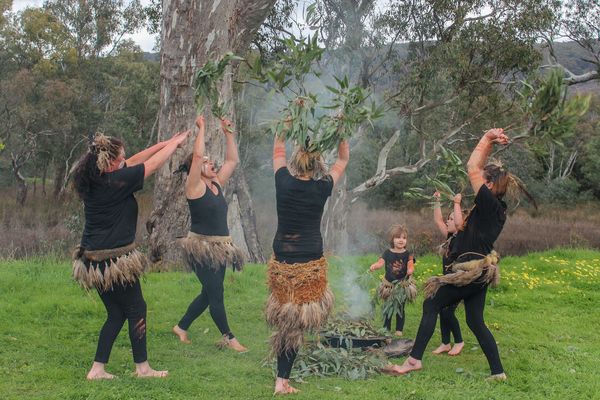The Victorian Environmental Water Holder (VEWH) acknowledges that Aboriginal people are intrinsically connected to Country and have been for tens of thousands of years. Over millennia, Aboriginal people have shaped, managed and cared for the land and waterways that sustain them. Deep and sophisticated Aboriginal knowledge systems have enabled the survival of the oldest living culture on Earth.
The VEWH supports the Victorian Government recognition of the far-reaching and intergenerational consequences of colonisation and dispossession. We support the Government commitment to Treaty negotiations and the adoption of self-determination as the guiding approach in Aboriginal affairs.

The VEWH acknowledges the important contribution Traditional Owners and Aboriginal knowledge systems make to the Victorian environmental watering program. There is a meaningful intersection between the aims of the program – healthy waterways, healthy communities – and the deep and enduring obligations Traditional Owners have to Country and community. More can be done to increase this contribution and enable progress towards self-determination within the program.
The VEWH acknowledges that existing frameworks and processes for the management of water on Country do not adequately provide opportunities for empowerment and agency of Traditional Owners. Legislative and policy changes will be required – beyond VEWH’s remit – to better enable Traditional Owners to access and manage water on Country on their own terms. Adequately recognising and strengthening the rights and agency of Traditional Owners in water management is critical for achieving self-determination, but also more sustainable water management and improved waterway health into the future.
The VEWH, in partnership with Traditional Owners, the Department of Environment Land Water and Planning (DELWP) and our other program partners, will play its part to embed Traditional Owner influence and participation in the environmental watering program and support Traditional Owners on the path to accessing water and managing water on Country on their own terms. We will do this by listening, being humble, flexible, and remaining open to change.
The VEWH will work within its power to:
- provide an informed, respectful and culturally safe environment within the VEWH and the broader environmental watering program
- create opportunities for Traditional Owners to influence and participate in the planning, decision-making, delivery and monitoring of environmental water on Country
- identify the barriers within the current environmental watering frameworks and processes to increasing Traditional Owner influence and participation, and deconstruct them or identify a clear pathway for change
- support Traditional Owner decision making, leadership and self-governance around water management and rights.
How VEWH plans to honour the intent of the statement over the next few years
The overarching sentiment in the statement is that VEWH will play an active role in supporting self-determination within and beyond the Victorian environmental watering program. Of course, the VEWH is not solely responsible for all actions required to achieve this goal. To be realistically reached, this work must be a collaboration between VEWH, Traditional Owners and all government agencies involved in the program.
The VEWH will work within its power to:
Create an informed, respectful and culturally safe environment within the VEWH and the broader environmental watering program
How will VEWH contribute to this?
As a critical foundational step, the VEWH aims to ‘get its house in order’. It will review and update VEWH policies and procedures to ensure VEWH activities (e.g. procurement, risk management) are culturally appropriate and enable Aboriginal participation and decision-making. It will support VEWH staff to increase their cultural competency through training and guidance. It will ensure culturally appropriate content in VEWH publications. The VEWH will work with program partners to embed Traditional Owner influence in the program (e.g. streamline activities and processes, support CMAs with Traditional Owner engagement, reinforce culturally safe practices).
Create opportunities for Traditional Owners to influence and participate in the planning, decision-making, delivery and monitoring of environmental water on Country
How will VEWH contribute to this?
The VEWH will develop targeted communications material to help Traditional Owners determine where key opportunities are in the environmental water program. The VEWH, through new and existing relationships, will gain a greater understanding of how, where and when Traditional Owner groups want to make decisions regarding water. The VEWH will provide water to priority sites identified by Traditional Owners with both ecological and cultural benefits. The VEWH will support environmental water projects with Traditional Owner defined objectives. The VEWH will provide opportunities for Traditional Owners to provide feedback on or participate in VEWH-led projects.
Identify the barriers within the current environmental watering frameworks and processes to increasing Traditional Owner influence and participation, and deconstruct them or identify a clear pathway for change
How will VEWH contribute to this?
The VEWH will work with Traditional Owners to better understand key barriers to increasing participation and agency in the program. The VEWH will review program legislative and policy obligations regarding environmental water to identify opportunities to increase and embed Traditional Owner influence, participation and decision making. The VEWH will investigate and where possible deconstruct barriers to Traditional Owners playing a more direct/formal role in the planning and delivery of environmental water.
Support increased Traditional Owner decision making, leadership and self-governance around water management and rights
How will VEWH contribute to this?
The VEWH will support Traditional Owner-led water projects with community-defined objectives. The VEWH has expertise to assist in advancing Traditional Owner decision-making, leadership and self-governance around water management and rights, and will make this available if desired. The VEWH will support identification and exploration of alternative models of management (e.g. co-management of environmental water, lease agreements, Aboriginal Water Holder). The VEWH will support the acquisition of cultural flow entitlements through the Sustainable Water Strategy or other processes.